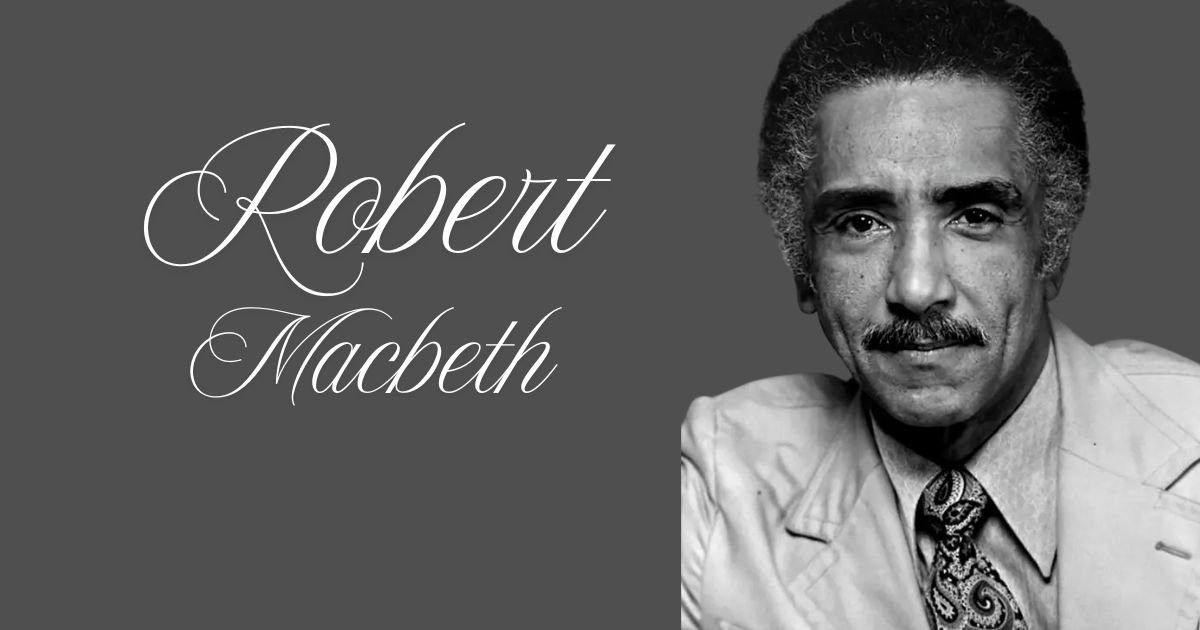Robert Macbeth was a visionary force who transformed American theater into a platform for black empowerment and radical change. Establishing Harlem’s New Lafayette Theatre, he developed a groundbreaking theatrical model that married creative performance with social protest during the Black Power movement’s most influential years.His work challenged societal norms amplified African American voices and redefined the role of theater in cultural resistance Born in 1930 in Baltimore Robert Macbeth began as an actor but quickly evolved into a director whose productions like The Devil Catchers and The Taking of Miss Janie became cornerstones of political theatre.
His collaborations with iconic figures such as Amiri Baraka and Ed Bullins solidified his legacy as a trailblazer in Black arts Though his life ended tragically in 1982 Robert Macbeths influence endures inspiring generations of artists to use the stage as a tool for justice and liberation
Who Was Robert Macbeth?
Robert Macbeth emerged as a revolutionary figure in African American theater, blending art with activism during the civil rights era. Born in 1930 in Baltimore, he began his career as an actor before shifting to directing, where he made his most lasting impact. As the founder of Harlem’s New Lafayette Theatre, Macbeth became a central voice in the Black Arts Movement, using the stage to challenge oppression and celebrate Black identity. His productions, like The Devil Catchers and The Taking of Miss Janie, fused raw storytelling with political urgency, earning acclaim and controversy.
Collaborating with luminaries such as Amiri Baraka and Ed Bullins, Macbeth pushed boundaries in Black theater, prioritizing authenticity and social change. Tragically, his life was cut short in 1982, but his legacy lives on in modern performances that continue his mission of resistance and empowerment.
The New Lafayette Theatre: A Revolutionary Stage
Robert Macbeth transformed Harlem’s cultural landscape in 1967 by founding the New Lafayette Theatre, a groundbreaking hub for Black artistic rebellion. More than just a performance space, it became a laboratory for radical storytelling where Black Power ideals merged with avant-garde theater. Macbeth’s visionary leadership nurtured works like Ed Bullins’ The Fabulous MissMarie, which redefined African American narratives through unflinching social commentary. The theater’s unique approach incorporated jazz improvisation, African rituals, and audience participation, breaking conventional theater norms. It served as both a creative sanctuary and political platform during the Civil Rights Movement’s peak years.
Though financial struggles forced its closure in 1973, the New Lafayette Theatre’s revolutionary spirit influenced generations of Black playwrights and performers, cementing Robert Macbeth’s legacy as an architect of transformative Black theater.
Robert Macbeth’s Directorial Philosophy
Robert Macbeth redefined theater as a weapon for social change, crafting a bold directorial vision that placed Black liberation at its core. His philosophy rejected passive entertainment, instead demanding audiences confront uncomfortable truths about race and power. Macbeth believed theater should function as a communal ritual, blending African storytelling traditions with contemporary political urgency. He championed raw, unfiltered performances that captured Black lived experiences, often incorporating improvisation and audience interaction to break the fourth wall. His approach emphasized collective creation, empowering actors to co-author productions through workshops and dialogue. This radical methodology challenged Eurocentric theater norms while celebrating Black cultural identity.
For Macbeth, every production at the New Lafayette Theatre served as both artistic statement and revolutionary act – a space where art and activism became inseparable. His enduring influence continues to inspire directors who view the stage as a platform for justice and transformation.
Legacy and Untimely Death
The Tragic End of a Visionary
Robert Macbeth’s life ended abruptly in November 1982 when he died by suicide at age 52. This tragic ending abruptly muted one of the most revolutionary forces in Black theater at the height of his artistic powers. Colleagues recalled his growing disillusionment with institutional barriers and the fading momentum of the Black Arts Movement as contributing factors to his depression.
Enduring Impact on Black Theater
Though his life was cut short, Robert Macbeth’s revolutionary influence persists. His work laid foundations for modern Black playwrights like August Wilson and directors like Spike Lee. The Movement Theatre Company and other modern ensembles continue drawing inspiration from the groundbreaking framework established by the New Lafayette Theatre. Today’s socially conscious performances about racial justice owe much to Macbeth’s fearless approach. His legacy proves that theater can be both mirror and hammer – reflecting society while shaping its transformation.
Must Read: Zero1magazinecom: Your Gateway to Art, Fashion, and Culture
Theater as a Weapon
The Stage as Revolutionary Platform
Robert Macbeth transformed theater into a powerful instrument of social change, declaring performance spaces to be battlefields for Black liberation. His productions at the New Lafayette Theatre weren’t merely entertainment – they were carefully crafted acts of cultural resistance that challenged systemic oppression.
Radical Storytelling Techniques
Macbeth weaponized theatrical conventions by:
- Incorporating African ritual elements
- Blending jazz improvisation with scripted dialogue
- Eliminating the traditional performer-audience divide through direct spectator interaction.
These innovative techniques forced viewers to confront uncomfortable truths about racism and inequality.
Enduring Influence on Activist Art
Macbeth’s philosophy that “art must disturb the comfortable and comfort the disturbed” continues to inspire modern socially-conscious theater. His belief in performance as political action paved the way for contemporary protest art and remains vital in today’s movements for racial justice.
Challenges & Controversies
Robert Macbeth’s revolutionary approach to theater faced significant obstacles and sparked heated debates:
- Financial Struggles: The New Lafayette Theatre battled constant funding shortages, relying on precarious grants and community support in an era when Black arts received little institutional backing
- Political Pushback: Conservative critics condemned his radical productions as “divisive” and “anti-American,” leading to increased scrutiny from authorities
- Artistic Conflicts: Macbeth clashed with traditionalists who opposed his experimental techniques, including:
- Rejection of conventional theater structures
- Incorporation of militant Black Power rhetoric
- Explicit depictions of racial violence
- Movement Tensions: As the Black Arts Movement fractured in the 1970s, Macbeth faced criticism from both moderates and more extreme factions
- Personal Toll: The constant battles contributed to Macbeth’s declining mental health, revealing the human cost of artistic activism
Despite these challenges, Robert Macbeth’s uncompromising vision ultimately transformed American theater.
Final Words: Why Robert Macbeth Still Matters
Robert Macbeth’s legacy transcends time, proving that revolutionary art never loses its power. In today’s era of social justice movements like Black Lives Matter, his vision of theater as a catalyst for change feels more relevant than ever. Macbeth taught us that performance isn’t just about storytelling—it’s about awakening consciousness and sparking action.
Modern playwrights, filmmakers, and activists still draw inspiration from his:
- Fearless confrontation of systemic racism
- Innovative blending of art and activism
- Unapologetic celebration of Black identity
The New Lafayette Theatre may be gone, but its spirit lives on in every artist who dares to use their craft as a weapon for justice. Robert Macbeth’s work reminds us that true art doesn’t just reflect society it has the power to transform it.
Thanks for visiting Globalexpressinfo.com. Don’t forget to share it on Twitter.






